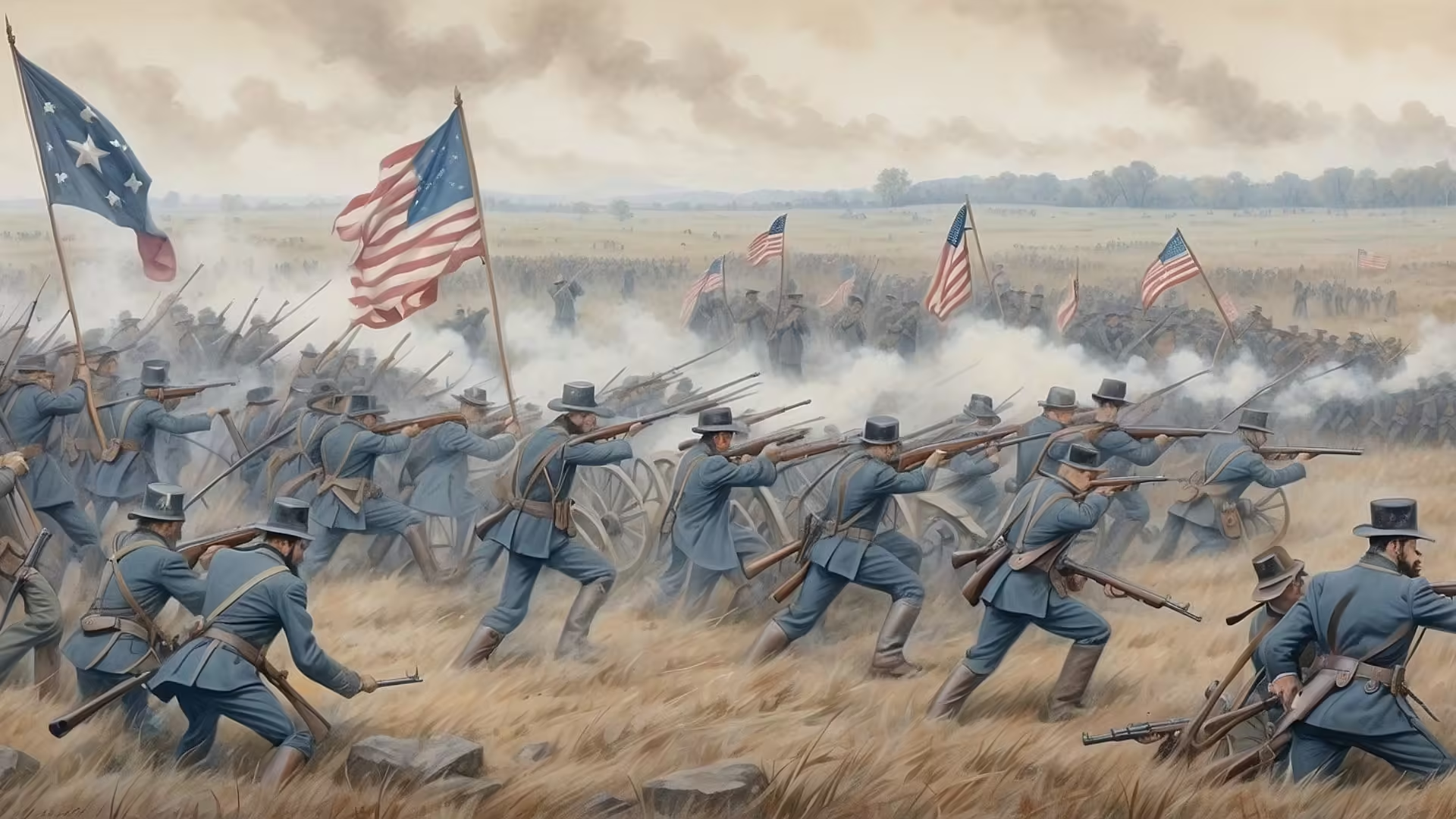- The Gist
- The Road to Gettysburg
- Day One: The Clash Begins
- Day Two: Bloody Combat on the Hills and Fields
- Day Three: Pickett’s Charge and the Turning Point
- The Aftermath: A Turning Point in the War
- Legacy and Lessons of Gettysburg
- A Defining Moment in American History
- Let’s Talk
- Let’s Learn Vocabulary in Context
The Gist
The Road to Gettysburg
In the summer of 1863, Confederate General Robert E. Lee led his Army of Northern Virginia into Union territory. After a series of victories, Lee hoped to strike a decisive blow by moving the war to the North, threatening Washington, D.C., and forcing the Union to negotiate peace. But what began as a bold offensive ended in disaster for the Confederacy. The small town of Gettysburg, Pennsylvania, became the backdrop for one of the bloodiest battles in American history, a place where the fate of a nation would hang in the balance.
Day One: The Clash Begins
On July 1, 1863, Confederate and Union forces accidentally collided near Gettysburg. What started as a skirmish soon escalated into full-scale combat, with both sides rushing to reinforce their positions. The Confederates initially had the upper hand, driving the Union soldiers through the town and forcing them to retreat to high ground at Cemetery Hill. However, the Union’s retreat was strategic, as they established strong defensive positions on the ridges south of town.
Day Two: Bloody Combat on the Hills and Fields
On July 2, Lee launched a series of attacks on the Union’s flanks, hoping to break their defenses. The fighting was fierce, especially at locations like Little Round Top, the Wheatfield, and Devil’s Den. One of the most famous moments of the battle occurred when Union Colonel Joshua Chamberlain and his 20th Maine regiment defended Little Round Top against repeated Confederate assaults. Outnumbered and low on ammunition, Chamberlain led a daring bayonet charge that drove the Confederate attackers back and secured the Union’s left flank.
Day Three: Pickett’s Charge and the Turning Point
The final day of the battle, July 3, saw one of the most infamous events in Civil War history—Pickett’s Charge. Lee ordered a frontal assault on the center of the Union line, hoping to break through and claim victory. Confederate General George Pickett led thousands of men across open fields under heavy artillery and rifle fire. It was a bold but doomed maneuver. The attack failed, with heavy Confederate losses, and marked the beginning of the end for Lee’s invasion of the North.
The Aftermath: A Turning Point in the War
The Battle of Gettysburg ended with the Confederate forces retreating back to Virginia. The Union’s victory was significant, not just for the morale boost it provided but for halting Lee’s northern advance. It also marked a shift in momentum—after Gettysburg, the Confederacy would never again mount a serious offensive in Union territory. The battle resulted in over 50,000 casualties, making it the deadliest battle of the war.
President Abraham Lincoln later visited the battlefield and delivered the Gettysburg Address, a brief but powerful speech that redefined the purpose of the war. His words, honoring the fallen and emphasizing the importance of unity and freedom, remain some of the most famous in American history.
Legacy and Lessons of Gettysburg
The Battle of Gettysburg was more than just a military victory—it was a symbolic turning point. It showed that the Union could withstand and repel the might of Lee’s army, giving the North hope that victory was possible. It also underscored the devastating human cost of the conflict, with the battlefield becoming a somber reminder of the sacrifices made for freedom and unity.
Today, Gettysburg stands as a symbol of resilience, courage, and the determination to fight for what is right. The battlefields have been preserved as a national park, allowing visitors to walk the same ground where soldiers fought and died. It serves as both a history lesson and a reminder of the costs of division, inspiring reflection on the importance of unity and peace.
A Defining Moment in American History
The Battle of Gettysburg was a turning point in more ways than one. It wasn’t just a military victory for the Union—it was a moment that shaped the future of the United States. The bravery and sacrifice of those who fought there remind us that history is not just about dates and events—it’s about the people who lived through them, the choices they made, and the legacy they left behind.
Let’s Talk
The Battle of Gettysburg—what a moment in history, right? It’s amazing how so much hinged on those three days in July 1863. And the more you think about it, the more layers it reveals. It wasn’t just a military battle—it was a moment where everything felt like it was teetering on the edge. Can you imagine what it must’ve felt like for those soldiers on the ground, not knowing whether they were witnessing the beginning of the end or just another chapter in a seemingly endless war?
What really sticks with me is how accidents and decisions can shape history in ways no one sees coming. The whole battle started because soldiers from both sides just happened to run into each other near Gettysburg. It’s almost absurd. If they had missed each other by a day, or even a few hours, history could’ve been completely different. It’s a bit like when you randomly bump into an old friend, and it changes the entire course of your day—or maybe even your life. It makes you wonder how many “accidental” moments in life end up being far more important than we realize at the time.
And what about the people of Gettysburg? Imagine living in a quiet little town, only to wake up one morning to find tens of thousands of soldiers fighting in your streets and fields. What do you even do in that situation? There’s no way to prepare for something like that. But in a strange way, it’s a reminder that history doesn’t just happen somewhere else—it happens right where we are. It makes me think about how we’re all, in some way, part of larger stories that are unfolding around us, even if we don’t realize it at the time.
One of the most interesting parts of Gettysburg for me is Pickett’s Charge. Can you picture it? Thousands of men marching across open fields toward heavily fortified positions, knowing full well they were walking straight into a death trap. What drives someone to do that? Duty? Honor? Peer pressure? It’s easy to look back and say it was a foolish decision, but from their perspective, it must have felt like they had no choice. It makes you wonder—how often do we find ourselves charging into situations, even when we know deep down it’s not going to end well?
And then there’s the Gettysburg Address. Lincoln gave that speech in just a few minutes, but it’s stuck with us for generations. It wasn’t just about honoring the fallen—it was about redefining what the war was really about. He took all the chaos, fear, and loss of the battlefield and reframed it as part of a larger struggle for freedom and equality. It’s a powerful reminder that even in the darkest moments, there’s always room to find meaning and purpose.
So, what does Gettysburg teach us today? Maybe it’s that life doesn’t always give us neat, clean victories. Sometimes it’s messy. Sometimes, even when you win, you still carry the weight of what was lost. But maybe that’s okay. Maybe the point isn’t to avoid conflict or struggle, but to find a way through it with our integrity intact.
What do you think? Have you ever been in a situation where you felt like you were part of something bigger than yourself, even if it was hard to see in the moment? And how do you handle those moments when you know you’re walking into something difficult, but you do it anyway? These questions might not have easy answers, but they’re worth reflecting on—because in the end, history isn’t just something that happens to other people. It’s happening to all of us, every day.
Let’s Learn Vocabulary in Context
Let’s break down some of the key words and phrases from the story of the Battle of Gettysburg and see how they fit into real life. First up is turning point. In the context of the battle, it means the moment when the tide of the war shifted in favor of the Union. But in everyday life, a turning point can be any significant moment when things change direction, like a career breakthrough or even a personal decision that changes everything. Ever had one of those moments where you thought, “Yep, after this, things will never be the same”? That’s a turning point.
Another key phrase is frontal assault. This refers to a direct attack on the enemy’s position, which is exactly what happened during Pickett’s Charge. In real life, you might use it metaphorically—like when you decide to address a difficult issue head-on, no sugar-coating, just straight to the point. “I made a frontal assault on my fear of public speaking and signed up for that presentation.” It’s about taking a direct approach, even when it’s risky.
Now let’s look at retreat. After the Union victory, the Confederate army had no choice but to retreat back to Virginia. Retreat isn’t just a military term—it’s also something we do in everyday life when we need to step back and regroup. Maybe you’ve retreated from a toxic situation or decided to take a break from social media to recharge. Sometimes, retreat isn’t about giving up—it’s about knowing when to step back so you can come back stronger.
Then there’s strategy, which played a huge role in the battle. Strategy means having a plan of action designed to achieve a goal. We use strategy all the time—whether it’s planning a project at work, figuring out the best way to approach a conversation, or even deciding how to tackle chores on a busy weekend. “My strategy for Saturday: finish laundry early and reward myself with a movie.” It’s all about making a plan that works for the situation.
Sacrifice is another heavy word from the story of Gettysburg. The soldiers who fought and died on that battlefield made the ultimate sacrifice for what they believed in. In our lives, sacrifice can mean giving up something we care about for the sake of a bigger goal—like skipping a night out to save money for a dream vacation, or sacrificing time to help a friend in need. Sacrifices aren’t always easy, but they’re often necessary.
Finally, let’s talk about legacy. The Battle of Gettysburg left behind a powerful legacy that still resonates today. In a more personal sense, legacy is about what we leave behind—our actions, the impact we have on others, and how we’re remembered. You don’t have to be a general or a president to leave a legacy. Every kind word, every choice to help someone, becomes part of the legacy you’re building.
So here are a couple of questions to reflect on: Have you ever had a turning point in your life that changed everything? And what’s a sacrifice you’ve made recently that was tough but ultimately worth it? These words remind us that the lessons of history aren’t just confined to the past—they show up in our lives in all kinds of ways.










0 Comments